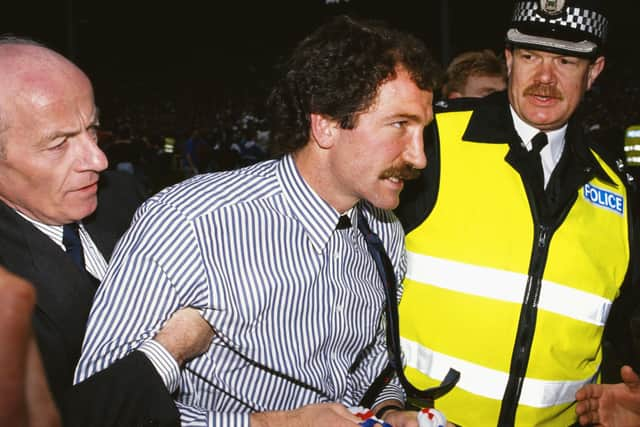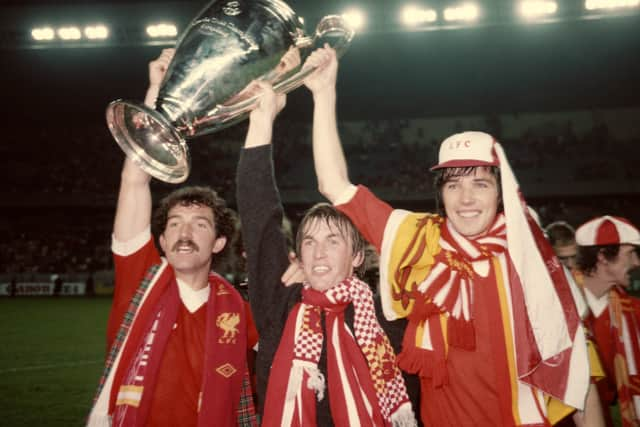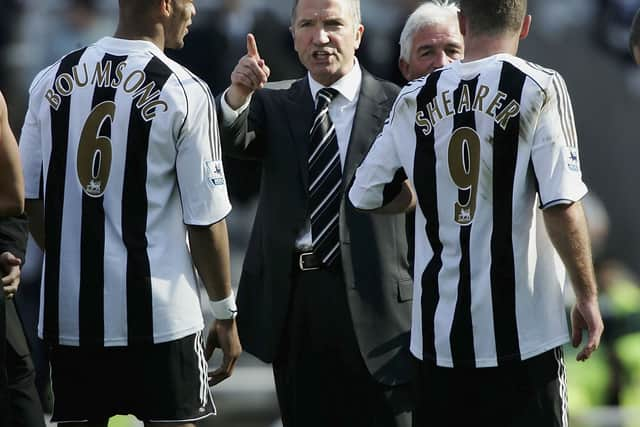Booze, broken jaws and constant controversy - 70 years of Graeme Souness
and live on Freeview channel 276
“When I look back on my antics,” Graeme Souness told the Daily Record in 2009, “I bordered on being out of order. I was obnoxious and difficult to deal with.”
Souness was talking about his time as manager of Rangers, between 1986 and 1991, but he could just have easily been talking about several other points in his career. Few managers have come to blows – verbal and physical - with so many players and officials. Few pundits have angered so many viewers with ill-judged or unnecessary remarks. But then, few of either have inspired as much appreciation and affection among fans and colleagues – and, of course, few have won three European Cups as a player.
Advertisement
Advertisement
Souness – who turns 70 today – is a contradiction and a contrarian. He’s Paul Pogba’s persecutor whose own attitude problems contributed to a club getting rid of him. He’s a climate-conscious vegan Conservative voter who spoke with immense empathy about homophobia in football. He was captain of one of the most successful club sides in history but fell out with half the people he shared a dressing room with. He’s the “cuddly chap” who broke an opponent’s jaw. He is, in short, a deeply complicated man.


It was at Middlesbrough where his career took off, and where he first rubbed authority up the wrong way. His manager, Jack Charlton, discovered that he was in charge of a young man possessed of supreme self-confidence and a distinct fondness for the local nightlife. As Souness put it later, “I was lazy and I knew it. Jack took me to one side and had a chat. He told me to pull my socks up… I responded and things just got better and better.”
But Charlton’s influence was only temporarily able to keep him Souness track – by 1978, with Charlton gone, the 25-year-old Scot went AWOL and Boro decided to get rid despite him being one of the club’s best players. Luckily for Souness, the reigning European champions were willing to take a chance on him – and his seven seasons at Liverpool were glorious and medal-laden, winning him three European Cups, five First Division titles and four League Cups.
Souness clearly cleaned up many elements of his act at Anfield and was appointed club captain in 1981 – much to the chagrin of team-mate and later Sky Sports colleague Phil Thompson, who felt Souness had “stolen” the captaincy, and would go on to make some deeply uncivil remarks about Souness’ first wife. The two came to loathe each other over time, culminating in Souness sacking Thompson from the Liverpool staff when he was manager there - and while the publicly-known facts about that feud suggest that Thompson was likely in the wrong, Souness fell out with a long list of clubmates and managerial charges down the years – Tommy Smith, Andrew Cole, David Dunn, practically the entirety of the Scottish FA… it was plainly not easy to stay on his good side, and Souness was never afraid of telling people what he thought about them.


Advertisement
Advertisement
Despite his combustible personality, he tended to keep his cool in high-pressure situations on the field. In 1984, as Liverpool edged towards a superb treble, he found himself up against Dinamo Bucharest in the second leg of the European Cup semi-final – and the opposing players took every opportunity to surround him, barrack him, kick him and wind him up. He maintained his composure throughout and played a huge role in the eventual win, going on to score a penalty in the final shootout against Roma. The Dinamo players, in their defence, had some just cause for their antics – he had broken the jaw of their captain, Lică Movilă, in the first leg, an incident which had been missed by the referee.
Nor was it only opponents who found themselves on the receiving end of acts of violence - when Alan Kennedy failed to pass to him a few times in training, claiming not to have seen Souness, the Scot punched him in the face and asked “can you see me now?” Cool when he needed to be, less than cool for plenty of the rest of the time, the way he has lived much of his life.
Nor was his capacity to keep calm under fire entirely consistent. One of the most famous incidents in his career was sparked because he lost his temper in the face of insults – although it made him something of a hero for many and provided one of the defining images of his career. It was, of course, the time he planted a Galatasaray flag in the middle of Fenerbahçe’s stadium.
When Souness joined Galatasaray as manager in 1995, a Fener official rather unpleasantly queried why their rivals would employ a “cripple” – a reference to heart surgeries that Souness had undergone. When, nearly a year later, Souness led his team to victory in the Turkish Cup, beating their eternal rivals in the final in Fenerbahçe’s Şükrü Saracoğlu Stadium, he was handed a flag and, claiming to have become enraged after seeing that official in the stands, planted it in the centre circle, almost sparking a full-blown riot and causing a fan to attack him as he fled down the tunnel.
Advertisement
Advertisement
For Fenerbahçe fans, it was an unbearable humiliation. For Galatasaray supporters he became a legend, drawing comparisons to folk hero Ulubatlı Hasan, who was killed as he planted the Ottoman flag during the siege of Constantinople. By any standards, it was a diplomatically incendiary decision which he admitted to regretting.
It wasn’t the only incident of questionable judgement in his career, of course – as Southampton manager he was famously duped into signing the “fake footballer” Ali Dia, a semi-professional who bluffed his way into the Saints’ squad and was memorably subbed on for Matt Le Tissier in a Premier League game before being almost immediately taken off again after his absence of ability became apparent. As a pundit, he was heavily criticised for saying Fernando Torres had “raped” Nemanja Vidić on RTÉ. The controversial, unpleasant and absurd never seemed to be too far away whether he was a player, a coach or simply warming a broadcaster’s sofa.


None of which changes the fact that he was a brilliant player, of course, and that he was mostly a very good manager, even if he tended to drive everyone else at his clubs up the wall before too long. Any dressing room he was in charge of tended to develop a somewhat toxic atmosphere over time – when he was in charge everything was his way or the highway, and that soured many relationships. Sometimes it was gradual – as at Rangers or Blackburn Rovers – and sometimes it was extremely rapid, such as his brief and ill-starred spell as Torino manager.
Many players have implied in later interviews that his excessive disciplinary structures contributed to difficult relationships, although there is little suggestion that Souness ever saw himself as being much at fault. Bill Nicholson, who managed Souness at Spurs at the outset of his career, described him as “arrogant” and he was never possessed of anything less than absolute self-belief – a trait which contributed to his unquestionable greatness as much as it rubbed so many up the wrong way.
Advertisement
Advertisement
Perhaps the last word on Souness should go to Liverpool team-mate Michael Robinson, who said in 2016 that “I found him a very personal, cuddly chap who was actually quite vulnerable about being a human being with emotions. To this day, he still tries very hard not to be this lovely cuddly person, when really he is."
We want your feedback on 3 Added Minutes - details here
That quote may serve as the key to understanding a man whose undoubted greatness has sat alongside endless controversy. A brilliant but difficult man who will be well-remembered in as many places as his name will be cursed for years to come. Now retired from broadcasting, we will see and hear much less from Souness in the coming years – and that will be both a great shame and something of a relief at the same time. What is certain is that he is never going to be forgotten.
